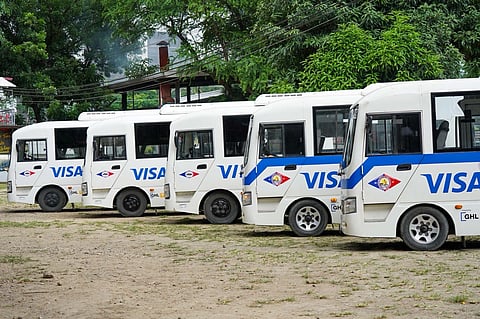
- NEWS
- the EDIT
- COMMENTARY
- BUSINESS
- LIFE
- SHOW
- ACTION
- GLOBAL GOALS
- SNAPS
- DYARYO TIRADA
- MORE

In a groundbreaking move that places the Philippines alongside its technologically advanced Asian neighbors, Visa has partnered with local firms to introduce contactless payments for modern jeepneys in the cities of Cebu and Mandaue.
The initiative, launched this week, marks Visa's first transit project in the country and signifies a major step towards modernizing public transportation and embracing cashless technology.
The project, a collaboration involving Visa, Good Transport Solutions Inc., and GHL Systems Philippines Inc., has equipped 140 modern jeepneys with Visa-accepting payment terminals.
It aims not only to streamline the commuting experience for locals, but also caters to the growing number of tourists in the region.
Catching Up with Asian Tigers
While the project is a significant leap forward for the Philippines, it’s worth noting that several of its Asian neighbors have already implemented similar systems:
1. South Korea: Seoul's T-money card system, introduced in 2004, allows seamless travel across various modes of public transport, including buses, subways, and even some taxis. The system has since evolved to include credit card tap-and-go payments and mobile phone-based transactions.
2. Singapore: The city-state has been using its EZ-Link card since 2002, which works on buses, MRT, and LRT. In 2019, Singapore launched SimplyGo, allowing commuters to use contactless bank cards or mobile wallets for transit payments, similar to the new system in Cebu and Mandaue City.
3. Thailand: Bangkok introduced the Mangmoom (Spider) Card in 2018, aiming to unify payments across different transit systems. While its rollout faced some challenges, it represents Thailand's push towards integrated transit payments.
4. Hong Kong: The Octopus card, launched in 1997, is one of the world's earliest and most successful transit payment systems. It has expanded beyond transportation to include retail purchases and access control.
Belated Inception, Encouraging Outlook
Jeff Navarro, Visa Philippines country manager, expressed enthusiasm about the project: "We are thrilled to unveil Visa's inaugural transit project in the Philippines. This initiative aims to enhance the travel experience for daily commuters and tourists in Mandaue City by offering a wider array of payment options."
While the Philippines may be late to the game compared to its neighbors, this project represents a significant step forward. The initiative aligns with global trends and addresses the preferences revealed in Visa's Global Urban Mobility survey, which found that 58 percent of commuters favor a unified payment method for all transport modes.
Looking ahead
As urbanization accelerates across Asia Pacific, with an estimated 120,000 people moving to cities daily, efficient public transit systems become increasingly crucial. The Philippines' entry into modern transit payments is timely and necessary.
Brezhnev Tero, CEO of GTSI, emphasized the project's significance: "By leading the way in transport innovation, we are making every journey smoother, faster, and more convenient, setting a new standard for public transport in the country."
While the Philippines is taking its first steps, countries like South Korea and Singapore are already exploring next-generation systems, including blockchain-based solutions and AI-driven transport management. However, the Cebu and Mandaue City project provides a solid foundation for future expansion and innovation.
As the Philippines continues to develop its transit payment systems, it has the advantage of learning from its neighbors' experiences. With plans to extend Visa's contactless payment system to other modes of transit across the country, the Philippines is poised to rapidly close the gap with its Asian counterparts in the realm of modern public transportation.
The future
The e-Jeepney is the base work for mass transport outside Metro Manila, hopefully in the near term and just like with our Asian neighbors, there is integration across other transport platforms to benefit the majority of commuters.
“One thing is for sure, Cebu now becomes a very transport-friendly area for tourists moving forward."
